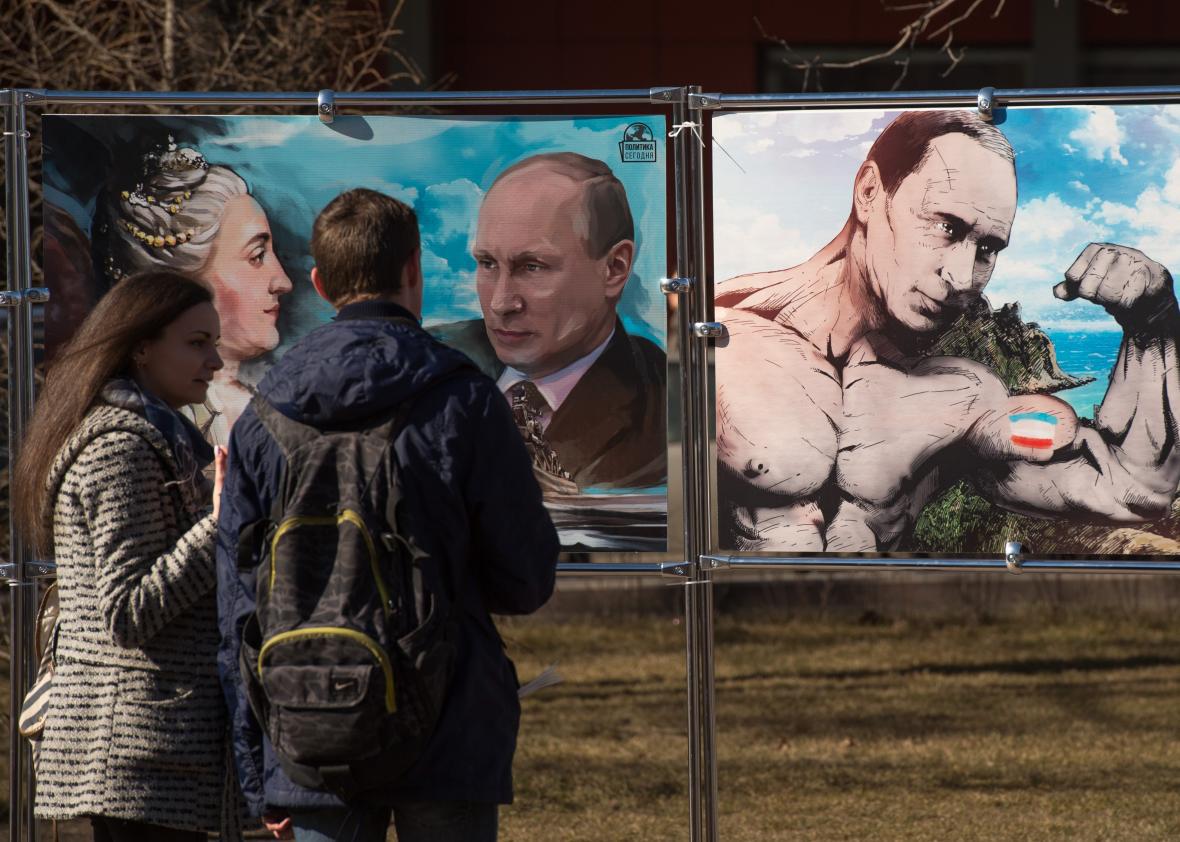Remember the days when Republicans attacked President Obama for being too soft on Russia’s Vladimir Putin? Today, the line is that he’s not enough like Putin.
The latest round of this absurdity started at a candidate forum two days ago when, asked by Matt Lauer about his approval of Putin’s leadership skills, GOP nominee Donald Trump cited Putin’s “82 percent approval rating” and suggested that actions like annexing Crimea and supporting Syria’s Bashar al-Assad aren’t as bad as “some of the things that President Obama does.”
On Thursday, Trump’s running mate Mike Pence added his two cents, saying, “I think it’s inarguable that Vladimir Putin has been a stronger leader in his country than Barack Obama has been in this country.” Former Trump campaign manager turned CNN talking head Corey Lewandowski also says that Putin is “a stronger leader” than Obama. And conservative radio host Hugh Hewitt added Friday morning that while Putin is an “evil man” he has “served his country’s national interest better” that Obama has served the U.S. Pollster Frank Luntz took this to its logical conclusion, asking in a Twitter poll:
You see who’s ahead.
This is a highly stupid conversation for a lot of reasons, but the main one is the assumption that people in all countries want the same things from their leaders and perceive their national interests in the same way. Putin may be the leader that Russians want, but that doesn’t mean he’s serving his nation well.
Trump is right that Putin polls very well, even in polls conducted by the independent and frequently critical Levada Center, which as it happens, the government blacklisted as a “foreign agent” this week, something I assume the ratings-obsessed Trump fantasizes about being able to do. Most Russians get their news from state-affiliated television networks and voicing dissent is not the safest activity in the country, but we can still assume that a lot of the support for Putin is genuine and deeply felt. At his lowest point, Putin was polling at 61 percent, a number Barack Obama, not to mention Trump, would happily take.
Remarkably, Russians are backing Putin in spite of the longest recession in two decades, caused by the drop in global oil prices decimating the country’s energy-dependent economy. Millions of Russians sank into poverty last year as wages stagnated, and consumers are cutting back on food and medicine because of inflation.
Today’s Russia is a place where government officials are corrupt, life expectancy remains stubbornly low, young soldiers are sent to die in wars their government won’t even acknowledge, opposition politicians and critical journalists are murdered or arrested in alarming numbers, LGBTQ people are subject to state-sanctioned violence, and entire regions are run as the personal fiefdoms of despotic warlords.
Russians don’t even like their government that much (53 percent of them disapprove of it according to Levada’s numbers). They just really like Putin. And despite everything I just said, I don’t blame them, given what came before him. In the generation before Putin’s elevation to power, Russians saw an empire collapse along with an ideological system that millions had placed their faith in for decades. Instead of peace and prosperity, the transition to democracy and capitalism brought a decade marked by corruption, crime, terrorism and distress coupled with the enrichment of a small new class of politically-connected oligarchs. Given the options they’re now seriously considering, I shudder to think of the kind of politicians Americans would elect after something equivalent to the Yeltsin years.
Whatever else he may be, Putin projects responsibility, sobriety (in multiple senses of the word) and a steady hand on the affairs of state. And he has, indeed, ensured that Russia remains relevant on the world stage, righting what most Russians perceived as a grievous historical wrong by retaking control of Crimea and re-establishing Russia as a critical player in the Middle East.
A large majority of Russians believe that having a strong leader is more important than having democracy. They believe it is natural for Russia to have an empire, and that it is unfortunate that the Soviet Union no longer exists. Based on recent trends, we can assume that they’re also willing to trade domestic economic wellbeing for an active foreign policy that extends Russia’s geopolitical influence—something President Obama has often failed to understand in his dealings with Putin.
Most Americans, however, would not be wiling to accept an economic situation akin to Russia’s in exchange for, say, a more effective strategy in Syria. And while this election has tested my faith, I don’t believe Americans are willing to sacrifice competitive elections or a critical media for a leader with some abstract quality of strength.
Putin may be giving Russians the leadership they want, but suggesting that this tells us anything useful about how a U.S. president should govern isn’t just misguided, it’s un-American.
